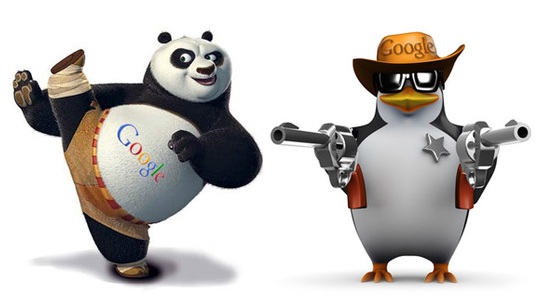 Reading Time: 4 minutes
Reading Time: 4 minutesSo many changes have come from Google lately that our heads are spinning. Panda and Penguin have slapped us around and have yet to tire. They are still going strong, leaving us dazed and confused as to what these two want to be fed at the Google zoo. In the midst of the smacking there have been changes to Search + Your World, ads above the fold, search quality for video, knowledge graph and much more. But what about articles?
Past practices of article spinning, using article syndication sites to push out mass versions of a single article and submitting the same article to various sites need to be left in the past. (Using the same article over and over was never a good idea anyway… just saying…). So what do you do now to be successful with article syndication?
Change Your Mindset
Think like Google. Stop concentrating solely on the link acquired. Think quality. Think expertise. Think of becoming a resource.

Google has turned up the heat on their algorithm for one primary purpose: to supply quality content to its searchers. Add that to social media supplying us with direct access to the social graph and share capabilities, there is no better time than now to produce and network great, resourceful content straight to your target audience.
As online media evolves and Google pushes for the highest evolution possible, quality content is back at the center of Google’s attention. As a content marketer, it needs to be at the center of your attention.
This will help your brand with reach, vitality and establishing yourself as a thought leader and your company peeps as experts in your industry.
Changes for Article Syndication
First of all, have a plan. Without a strategic plan with goals attached, your article marketing attempts will be nothing more than just that. Ask yourself these questions:
- What will you write about and why? What value will the articles offer?
- Who will find these articles valuable? Where (on what sites) is your target audience reading this type of information?
- What information are they seeking that you can deliver?
- How often will you create and post articles? What frequency can you commit to for your editorial calendar?
Second, know what sites to publish on.
- What are the profile and login requirements?
- What are the rules and regulations?
Know that high quality article sites will not accept duplicate content in any form. It has to be fresh, not spun or rewritten and it cannot be the same article as on 50 other sites. Why? They want to keep the integrity of their site and their reputation as a resource hub.
Think from the consumer’s point of view. If you were searching the Web for the best cold medicine and came across the same article across multiple sites from the same cold medicine company, you would not be very impressed. You’d think they only had one answer and couldn’t articulate their own product in multiple fashions. You’d also think them spammers.
Reliable information such as how-to’s, tips, facts, fun Q&A’s and the like all become resourceful information for consumers. These types of assets on the Web become what consumers depend on to make good buying decisions.
Think of one of your favorite brands and what they’ve done to earn your trust. Did they add images or videos into their posts to make it richer?
For example if you Google “Dove chocolate” several resources will populate including their social media sites, images, different wikis, their promises, paid ads on how to become a Dove chocolatier, information on calorie counts, fun videos and more. All of these assets collectively make up their branding as chocolate experts and gain the trust of their consumers. These resources on the Web will influence buyer behavior where many will chose Dove chocolate over Hershey’s.
Where to Publish Worthy Articles
Once you have your plan with goals, know what you will write and what frequency you will post. You also need to know where to publish your article content.
2 Rules of thumb:
1) Don’t publish to article syndication sites. Yes they will push one article out to many sites and score a link for each one, but Google will only index the first article and most of the links will be no follow, so what’s the point?
2) Don’t use spinning software or spin tokens. The content comes out choppy and not only will the reader raise an eyebrow but so will Google. And now-a-days when Google raises and eyebrow the pandas and the penguins get called. So don’t do it.
For each article site you are manually submitting to, write a fresh article on a fresh industry related topic or from a fresh business related angle. Articles should be resources, not sales pitches. Write about what your readers will care about, such as the suggestions above. Examples would be if you are in the travel industry, write about tips for traveling with children. If you own a cabin you rent out on the weekends, write about tips for chopping wood for the fire, camping tips or how to pack light. Think like your target audience thinks. What do they need to know?
Post on industry related article sites or top article/resource sites (also known article directories) such as these top 7:
Know that each site will have a different requirement for setting up and logging into your account. For example, eHow requires you to sign in either through Facebook or Google. That means you have to have one of these accounts to be able to have and use an eHow account. HubPages gives you the choice of signing in via email and password or through Facebook.
Take the time to get to know each site for login and account requirements as well as editorial guidelines. Some will allow an anchor text link in the body of your article and some will not. Some will allow videos and images to be embedded while others will not. Word count requirements will be different per site as well. Some sites, like HubPages and Squidoo, have communities with voting systems while others do not.
Get to know each and test what works best for you. Optimize and add social shares. Encourage commenting and dialogue. Spread the word about your articles on your social channels and refer to them by linking to them from your Website and blog. Refer to them later as well to keep them alive and worthy.
For help with article development and content marketing that avoids the vicious slaps, give us a shout.
At Vizion Interactive, we have the expertise, experience, and enthusiasm to get results and keep clients happy! Learn more about how our Content Marketing services can increase sales and boost your ROI. But don’t just take our word for it, check out what our clients have to say, along with our case studies.




